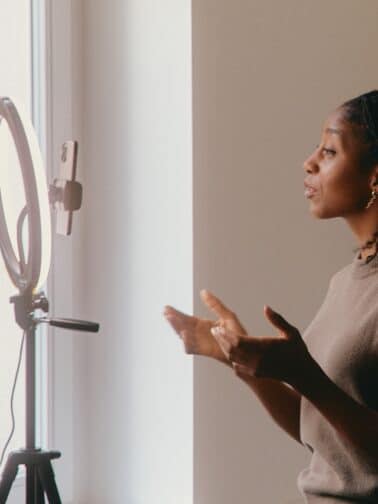Boundaries are one of my very favorite subjects to talk about.
Boundaries, to my mind, are one of the cornerstone psychological habits that we all have to learn.
Good boundaries protect us, protect others, and good boundaries help us experience safety, well-being, happiness, and fulfillment in life.
And, good boundaries are especially critical to focus on learning and improving if you come from a relational trauma background (my clinical area of expertise).
But how do you know if your boundaries need work?
How do you know if you have poor boundaries and you need to improve them?
Today’s post is a list of 15 signs that your boundaries need work along with some additional information about what boundaries are, and why they’re so darn important.
What exactly is a boundary and why are they so important?
“When we fail to set boundaries and hold people accountable, we feel used and mistreated.” – Brené Brown, Ph.D.
So what exactly is a boundary?
I’m sure most of us when quizzed, will be able to somewhat know and understand what boundaries generally are.
A sign that says “Do Not Enter.”
A beautiful New England rock wall fence that separates your neighbor’s property from yours.
The hours of operation for a business.
Country border entry and exit points.
All of these are all well-understood and fairly obvious examples of spatial and logistical boundaries that most of us more or less accept, respect, and understand.
But when it comes to our personal lives, boundaries aren’t always so clear.
Personal boundaries are often more subtle, nuanced, and hard to understand.
But here’s how I want you to think of them:
Boundaries are the invisible, ever-changing protective fences of our lives.
They help let in what’s good and help keep out what’s not.
Moreover, they help keep us from negatively impacting others.
Good boundaries can positively impact everything from our energy levels to our sense of esteem, to our bank accounts and the quality of our relationships.
Conversely, poor boundaries can negatively impact each of those same content areas.
Because they’re so omnipresent, because they’re so universally impactful, this is why I consider boundaries a cornerstone psychological habit that each of us must master.
Ideally, we grow up in homes where healthy and appropriate boundaries are modeled and explicitly taught.
But if we don’t, it’s never too late to work on your boundaries and develop the skill of having and holding good, functional boundaries as you move through the world.
In fact, this is what I teach in my signature online course.
But how do you even know if you need to work on your boundaries?
How do you know if your boundaries are poor and you may need to invest some time and energy into improving them?
Here are 15 of the most common signs that your boundaries are, in some way, poor, porous, or in need of work.
15 signs that your boundaries need work.
“Talking to her is like swimming in a sea and being stung repeatedly by an enormous jellyfish.” – Bridget Jones
You feel resentful.
Resentment is a complex feeling state that often signals we have a sense of having been “wronged” by someone. Examples include taking on more responsibilities than you would prefer at your child’s school and then feeling bitter as you move through the activities. You resent having been asked and you resent the time and energy it’s taking.
Why Doesn’t Your Success Feel as Good as It Looks?
A quiz to help you understand why you might feel less stable beneath the surface despite working so hard to build a good life.
START THE QUIZ
You dread it.
Dread is a form of anxiety – fear of the future – and, in many situations, it’s a clue that we’re crossing our own boundaries by, again, committing ourselves to something that we would rather not. Holidays with the in-laws, a happy hour that falls in the smack of our precious evening hours with our kids. Dreading something on our calendar and to-do list can be a sign that we’ve compromised our own boundaries by committing to something we would rather not.
You feel exhausted and drained.
Exhaustion and fatigue are common clues that we’ve eclipsed our personal boundaries in obvious ways – working a far too long workday, for instance. But they’re clues, too, that can signal our boundaries are poor in relational interactions: if we leave a “friend” feeling more tired, drained, and self-critical than nourished and fulfilled, it could be a sign that your boundaries were tested or crossed in that relationship dynamic and can beg the question of why this is happening (both in the moment and why you keep putting yourself around that person).
You feel like you just “can’t.”
Feeling like you can’t say no, that you can’t decline, back out of, or make a different choice is a common signal that your boundaries might need work. If saying “no” or letting someone down feels hard, we really need to be curious about why that is, what’s so hard about saying no and potentially let someone down, and then do the boundary-repairing work to help you tolerate this.
You feel hurt.
If you walk away from a conversation with someone, stung and hurting, but not entirely sure why this is happening and you have no clue how to stop it from happening, this is sometimes a clue that your boundaries are being crossed in a relationship interaction. Not being able to pinpoint how and why this is happening is another clue that your boundaries may need work and that we have to help you better understand what your personal boundaries are.
You notice irritation and/or anger rise up in you.
Anger is a sign that we have a need that’s not being met or that we have a boundary that’s being crossed. And irritation is a “lesser” cousin of anger, meaning it’s often the feeling state we allow ourselves to admit to because we imagine it’s less acceptable to admit we’re feeling anger. But both of these feeling states can be big clues that our boundaries are being crossed and may need to be asserted and worked on.
You find yourself in a martyr attitude and in martyr-like situations.
Refusing help or not asking for help cleaning up the Thanksgiving meal while everyone else sits around digesting and chatting when all you want to do in the world is to also kick up your feet is a classic example. If you find yourself often feeling like a martyr or a victim, these are big tell-tales that your boundaries may need work (not to mention your assertive communication skills).
You feel judgemental of others’ choices.
A friend texts the morning you have plans canceling the plans because she doesn’t feel up for it. You think she’s being selfish and secretly you wish you could make the same choice yourself, but don’t allow yourself to do so because you feel it wouldn’t be the “right” and “responsible” thing to do. When the judgment of others’ choices paired with a secret longing of that same choice shows up, it’s a clue that you’re perhaps compromising your own boundaries and they could be improved upon.
You feel overwhelmed. Often.
All of us feel overwhelmed from time to time and many times external, uncontrollable events contribute to that overwhelm (hello COVID and Zoom homeschooling!). But if you’re very often overwhelmed and the situations that overwhelm you are largely self-created, this is a big sign and signal that your boundaries – likely at many levels – need work.
You feel envy and jealousy when you see people being direct and clear.
A waiter brings you and your girlfriend your meals. Both of you received orders that were different from what you ordered. She calls the waiter back and tells him so, asking him to bring her her correct meal. You stay silent (despite her prodding) and eat the meal you didn’t want to spend $35 on. Envious of her ability to ask for what she wants. And, frankly, envious of her corrected order that looks so good. Sound familiar? This kind of situation – feeling envious and jealous when you see others around you being frank and clear – is another sign your boundaries may need work.
You feel taken advantage of.
Very often you feel like people are taking advantage of you and your time, your energy, your skills and resources. Like you give an inch and they take a mile and there’s nothing you can do about it. This – feeling taken advantage of – is so akin to feeling like a martyr or a victim, someone without choice who is at the mercy of others and circumstances, and it’s a clue that your boundaries may need work.
Relationships in your life tend to be lopsided.
You feel frustrated and confused why you seem to attract fair-weather friends who expect you to hold space for them. To be their therapist, to be their career coach, and to pick up their calls whenever they need you. But they don’t give you the same in return. You see a pattern in the relationships in your life where you give more than you get. And it’s less a two-way street of give and take than a one-way highway to Self Sacrifice City. Experiencing this in your life may be another clue that your boundaries need work.
You’re burned out.
Like with feeling overwhelmed. Like with feeling exhaustion, dread, and being drained. Feeling burned out is usually the cumulative impact of you repeatedly crossing your own boundaries. (And having them crossed by others!) Your time, physical, mental, and emotional boundaries. That leads to a persistent state of burn out.
You “chameleon.”
You tend to lose yourself in relationships. And you become who and what the other person wants and needs you to be. In personality, preference, temperament, and even appearance. And you tend to merge and take on the preferences and characteristics of the other person. This is a sign your relational boundaries may need work.
You have a subtle sense and intuition your boundaries need work.
Finally, even if you don’t see yourself in the previously listed qualities and characteristics, if even a small part of you – a whisper, a murmur – thinks and believes that your boundaries may need work and that you would like to improve them, trust that part of you. It’s wise, it’s true, and it’s likely a signal that your boundaries may need work.
Now, if you did see yourself in any of the above points, please don’t feel discouraged.
It’s a very good (although sometimes hard) thing to see ourselves plainly.
But, when we do, we can get clearer and more strategic about getting ourselves the kind of support we need to address the reality of our situation.
Here’s to healing relational trauma and creating thriving lives on solid foundations.
Warmly,
Annie





